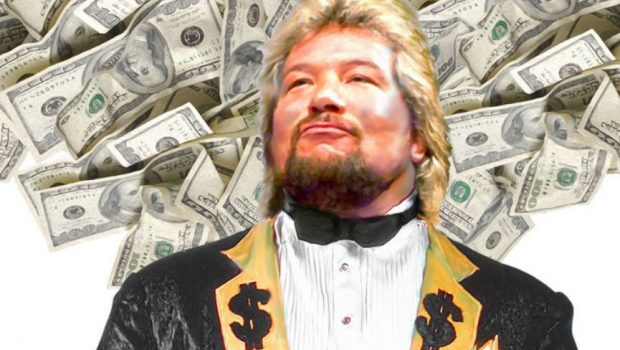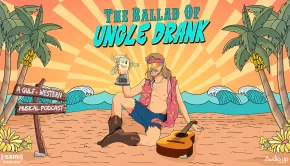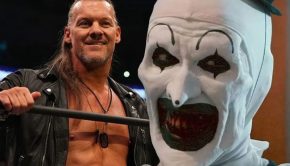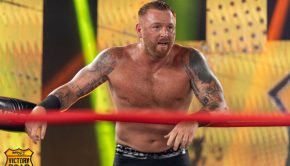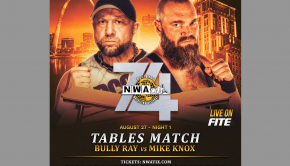“Million Dollar Man” Ted DiBiase On His New Documentary ‘The Price of Fame,’ Life After Wrestling, And Finding Faith
Known to millions of fans as the “Million Dollar Man,” Ted DiBiase is often regarded as one of the greatest villains in the history of professional wrestling. The off-screen life of DiBiase, as it turns out, has little to do with the on-screen villain that he has portrayed for many years. Instead, DiBiase is a devoted Christian, a family man, and an ordained minister at the helm of the Heart of David Ministry.
The journey of Ted DiBiase from a self-absorbed wrestler into a selfless, God-abiding man is documented in the new Peter Ferriero-helmed documentary, The Price of Fame: The Story of Ted “Million Dollar Man” DiBiase. The Price of Fame points to the exact moment in which DiBiase made his transition, and leaves the camera rolling when he speaks about difficulties times alongside wife Melanie and sons Ted Jr. and Brett; notably, Ted Jr. and Brett were both wrestlers, as was Ted Sr.’s stepfather Mike. The film also includes interviews with a variety of wrestling legends, including Shawn Michaels, “Hacksaw” Jim Duggan, “Rowdy” Roddy Piper, Terry Funk, Jim Ross, Sean “X-Pac” Waltman, George “The Animal” Steele, Mick Foley, Jake “The Snake” Roberts, and Bruce Prichard.
The Price of Fame will air in U.S. cinemas for one night only, courtesy of Fathom Events and Engage Media Partners. At 7 p.m. local time on Tuesday, November 7, The Price of Fame will be showing in more than 600 movie theaters; locations and tickets can be found via www.fathomevents.com. To learn more about Ted DiBiase — whose website is www.milliondollarman.com — I had the pleasure of speaking to him by phone.
First, I wanted to know how long you were filming for because I saw that some of the people interviewed for the film, unfortunately, we’ve lost since the film was made.
Ted DiBiase: Right, the project has been going on for probably three years, I think one of our hold-ups was getting footage from WWE, and I pretty much understand their stand on that… Pete [Ferriero] came to interview me for a totally different movie… He liked me as a character and so when you start doing what they call a “shoot interview” — in another words, asking me real questions about my real life… I guess the things that I said pretty much got all over him, we developed a relationship… This is his first shot at a documentary like this, and I am just really so pleased that we have been getting the response that we have.
So the focus of the movie sounds like it changed over time. Was it originally going to be focused on your career?
Ted DiBiase: No, it was never going to be a focus on my career. I mean, because when you hear my story, my personal walk with God, my redemption has very much to do with me being forgiven by my wife for adultery. I had strong faith as a young man, which carried me through a lot of difficulties when I was young. My stepfather died when I was 15, my mother sank into alcoholism, but I stayed true to my convictions then. Then when I got to college at the age of 18, it was as if I said, Thanks for all the help, Lord. I will see ya, I can take it from here.” For the next 20 years, it was all about Ted… I feel like God let me go get everything… It was meaningless without character and integrity and the love of my family, the really important things. And by the grace of God, through that process, not only was my faith restored but because of my wife’s willingness to forgive me, so was my marriage.
It is very courageous of you to put all that out there, did you ever have second thoughts about that?
Ted DiBiase: No, I didn’t, because it is like the Bible says: “Pride goes before the fall”… When I finally hit the wall and looked and realized that I had attained just about everything I could imagine, in terms of my career. A measure of fame that I never thought I would have or any wrestler would have. Yet, in the midst of that, with all that I had, I realized that in that moment when my wife got word of what I had been doing that if I don’t have her, and I don’t have my children, and I don’t have their respect, then I don’t have anything that matters.
Given how you have changed over the years, is it hard to replicate your character, like you do at the beginning on the film?
Ted DiBiase: No… You are kind of in and out of the character. My wife said that when I would come home off the road she could tell. She’d said, “You come off, it is kind of like you have your guard up all the time and you don’t even realize it.” We would drive home from the airport, which is about a 15-minute drive from here, she’d say, “I could see your shoulders relaxed”… But no, it is just something I can jump in and out of.
Your differentiation from your character and also your journey sound very similar to that of Alice Cooper. Is his journey one you are familiar with?
Ted DiBiase: I knew that Alice Cooper became a Christian, but I am not really familiar with his journey.
He came from a religious family then he went into rock ‘n’ roll, left that behind and eventually became born again and sober, relapsed, and he got the ultimatum from his wife. Is this a story that has happened to other friends of yours in the wrestling business?
Ted DiBiase: Yeah… There are a lot of guys that have been down the same road, or similar roads, whether it be adultery or drugs, booze, whatever it might be. The one thing that my dad never wanted me to be was a wrestler, and it was kind of like I had that same kind of attitude. What is good enough for dad is good enough for me. Of course when I got into the business and around it, I got to that place when I had my own children and realized I didn’t want them to be in it for the same reasons.
Again, it is not the business. That is why the story is called The Price of Fame… If you are an actress, it is not Hollywood’s fault. It is not the NFL’s fault, it is not the WWE’s fault, it is what you do with it… When I got into wrestling I knew what it was, I knew what kind of a lifestyle it was, but then you learn things as you go and I am a much wiser person… I get asked, “Would you change anything?” I’ve said, “Well sure, I would change some things.” But I also understand that had I not taken the journey I took, had I not been in the places I was and experienced what I did, I wouldn’t have the same of revelation today that I have. In other words, I think God uses all of the good and the bad to get you to a place where he wants, if you are willing to submit to him.
The film kind of stops covering your professional career around 1993, 1994, yet you continued with other wrestling companies and working in creative and all that. Did you still have a love for the business after you changed your lifestyle? Did it become more of a job and you are able to turn it off as soon as you left work?
Ted DiBiase: Well, it was something that happened gradually… When I started going out and speaking in churches and youth groups and things, the first time that our pastor gave an invitation after I had shared my story and all these teenagers came forward to receive Christ, to get right with God… I will never forget this red-headed freckled face, very skinny kid, kind of shoulder length hair. He threw his arms around my neck and he said, “All my life my parents, grandparents try to tell me why I needed Jesus and I just didn’t get it. But through your story today, I get and it is kind of like the light went off.” Oh my gosh, I mean God just used me to change this kid’s life and I tell people this: I have wrestled in front of 80,000 people and that is a pretty big thrill, but what happened there in that moment, you can’t even touch it. It was like a snowball rolling downhill, the more I went, the more invitations I got.
So it was like over a period of time. I mean, I didn’t just wake up one day and say, “I am going to leave wrestling and be an evangelist”… My active wrestling career ended at the end of ’93. I had too many discs in my neck that manifested themselves at that time. It was one of those things where I wasn’t sure what else I was going to do and then Vince McMahon calls me back and wants me to come and do commentary for him… That turned into him rehiring me because I had left the company, so he brought me back as a color commentator and a ringside manager. So I was still in the business and, yeah, over a period of time my love for it waned… I left WWE and went to WCW and I was there three years, really wasn’t happy with that. When that contract was over, that is when I jumped off and said, “Okay, I am doing this.”
And so, in the year 2000, I was ordained through my church… That is what I have been doing for 17 years. I mean, I did go back, I was asked to come back by the WWE and be part of [the] creative [team]. I really struggled with that… I knew I had a tremendous stream of influence there, but I am not Clint Eastwood, because he is good on both sides of the camera. You know he is very creative. You tell me what the story is, my gift is I can go out there and make the story happen. And so, it took them about a year and a half to figure that out, and so I left that and I came back to what I have been doing and I am very happy with it.
When you are not busy with your ministry and appearances, what do you like to do for fun?
Ted DiBiase: Well, I will tell you what. I am a grandfather now, I have two grandsons and I have two more grandchildren on the way… It is incredible that my daughters-in-law both got pregnant within two months of each other and so I love spending time… I never thought I would ever hear myself say I love being a grandpa but I absolutely love it. I love spending time with my family.
My wife and I, when we get a chance to go on vacation, we like to go on a cruise. For me, a cruise is great because I can do as much or as little as I want, because with all the traveling I do, you know the last thing I want to do… If I just want to stay on the ship I can.
But the one thing I do love, I love to scuba dive. My wife and I both are scuba divers so when we do cruise, we try to do a lot of that. I used to play a lot of golf, but I have had both of my knees replaced and I wasn’t a very good golfer anyway. I will still show up at some of these celebrity tournaments and just ride around the cart and putt.
In closing, Ted, any last words for the kids?
Ted DiBiase: You know, I tell kids all the time: You can be whatever you want to be. This is what my father told me, he said, “Son, don’t follow the crowd. That is easy, that takes no courage. What takes courage is to stand up and cut your own path in life. Be willing to dream your dream and in dreaming your dream, be willing to make all the sacrifices necessary to attain it. You can be the head, not the tail.” Be a leader, not a follower, but in leading, be led by Christ.
Tweet
